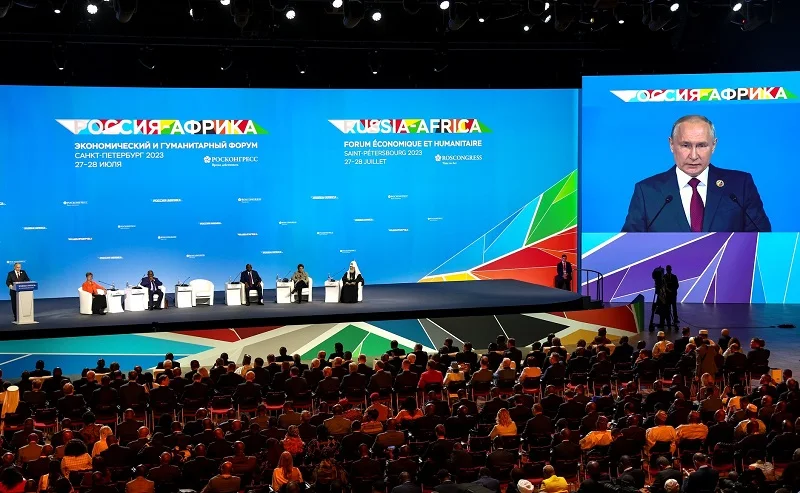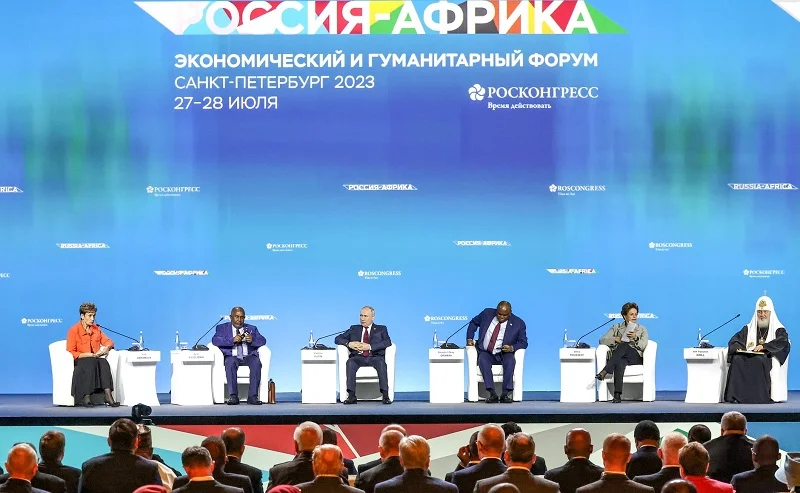A few days after it refused to further extend the Black Sea Grain Initiative, Russia on Thursday promised to replace Ukrainian grain to the “most needy African countries” – both on a commercial basis, and in the form of gratuitous assistance.
Stating that the country is expecting another “record harvest” this year, Russian President Vladimir Putin announced that Moscow will provide Burkina Faso, Zimbabwe, Mali, Somalia, the Central African Republic, Eritrea with 25,000-50,000 tonnes of grain free of charge, including ensuring its free delivery, in the next three to four months.
Putin emphasised the Kremlin’s commitment to countries of the African continent during his address at the plenary session of the Russia-Africa Economic and Humanitarian Forum held on the sidelines of the Second Russia-Africa Summit which began in Saint Petersburg from Thursday.
The meeting was also attended by top African leaders, including Chairman of the African Union and Comoros President Azali Assoumani, head of the Russian Orthodox Church Patriarch Kirill, Chairman of the Board of Directors of the African Export-Import Bank Benedict Orama and President of the New Development Bank Dilma Rousseff.
“We understand the importance of the uninterrupted supply of food to African countries – this is important for socio-economic development and for maintaining political stability. Therefore, we always pay and will continue to pay special attention to deliveries of wheat, barley, corn and other grain crops to our African friends, including as humanitarian aid through the UN Food Programme,” said Putin in his speech at the event.
The Russian President assured the gathering that his country is making every effort to prevent a global food crisis and striving to actively participate in the formation of “a more equitable system” for the distribution of resources.
“A paradoxical picture is emerging: on the one hand, the Western countries are obstructing the supply of our grain and fertilizers, and on the other hand, I will say frankly, they are hypocritically accusing us of the current crisis situation in the world food market. This approach was especially evident in the implementation of the so-called grain deal,” he said.

Listing stats, Putin alleged that of the total 32.8 million tonnes of cargo exported from Ukraine under the Black Sea Grain Initiative, more than 70 percent went to countries with high and upper middle income levels while the share of countries such as Ethiopia, Sudan, Somalia and a number of others accounted for less than three percent.
“In fact, nothing happened from what we discussed and what was promised to us. None of the terms of the deal, concerning the withdrawal from the sanctions of Russian exports of grain and fertilizers to world markets, was fulfilled. None. Obstacles were also raised for the gratuitous transfer of mineral fertilizers by us to the poorest countries in need.”
Putin believes that, with the application of appropriate agricultural technologies and the proper organisation of agricultural production, Africa in the future can not only feed itself, ensure its own food security, but also become an exporter of various types of food.
With Soviet and Russian specialists having designed and built large energy centres in Angola, Egypt, Ethiopia and other countries of the continent and more than 30 promising energy projects with Russian participation in 16 African states currently in varying degrees of development, the Russian President hoped for further development of cooperation with African countries in the energy sector.
Over the past two years, exports of Russian crude oil, petroleum products, and liquefied natural gas to Africa have increased by 2.6 times with Russian companies like Gazprom, Rosneft, Lukoil and Zarubezhneft engaged in the development of oil and gas fields in Algeria, Egypt, Cameroon, Nigeria, and Congo.
Africans leaders have arrived in #SaintPetersburg.
As the 2nd #RussiaAfrica Summit is already underway we greet our guests
Welcome!
— MFA Russia
(@mfa_russia) July 27, 2023
“Rosatom, our leading company in the use of nuclear energy, is building the Dabaa nuclear power plant in Egypt. At the same time, our state corporation can provide African countries with its unique experience and technologies that have no analogues in the world in the field of non-energy use of the ‘peaceful atom’, for example, in medicine and in the same agriculture,” remarked Putin.
In his speech on Thursday, Putin specifically mentioned the reorientation of transport and logistics flows towards the states of the Global South through the International North South Transport Corridor (INSTC) that India wants to be linked with
the Chabahar port in Iran being developed by New Delhi’s assistance.
INSTC, said Putin, can provide Russian goods access to the Persian Gulf and the Indian Ocean from where they can reach the African continent by the shortest sea route.
“Connecting the North-South transport corridor with Africa, launching regular shipping cargo lines – that’s what we are striving for – opening a Russian transport and logistics centre in one of the ports on the African east coast would be a good thing, a good start to this joint work,” said the Russian President.
Also Read: Weapons to atomic reactors, Russia vows to help Africa during Saint Petersburg meet



































































